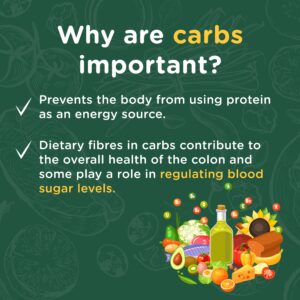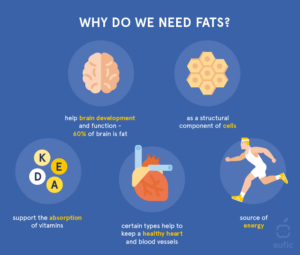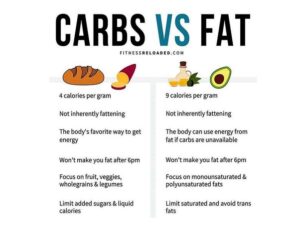 The decision between using Carbs & Fats For Athletes as primary fuel transcends simple nutritional preference. It's a critical strategic choice that significantly impacts several facets of their athletic life including performance efficiency, speed of recovery, and general well-being. This selection influences how their bodies respond to various types of training and competition stress. Given the complexity and high stakes of this decision, athletes need to understand the scientific foundations of how both carbohydrates and fats function as energy sources.
The decision between using Carbs & Fats For Athletes as primary fuel transcends simple nutritional preference. It's a critical strategic choice that significantly impacts several facets of their athletic life including performance efficiency, speed of recovery, and general well-being. This selection influences how their bodies respond to various types of training and competition stress. Given the complexity and high stakes of this decision, athletes need to understand the scientific foundations of how both carbohydrates and fats function as energy sources.
This article delves into the bioenergetic pathways through which both carbohydrates and fats are metabolized, providing a detailed comparison of their benefits and limitations. By dissecting the roles these macronutrients play in energy production during various intensities and durations of physical activity, the discussion offers tailored insights that help athletes make informed dietary choices. Whether it's the quick-release energy needed for sprinting or the sustained energy required for endurance, understanding the unique contributions of each macronutrient can empower athletes to optimize their performance, ensure efficient recovery, and maintain an overall healthy physical state. The insights and advice herein are intended to guide athletes across all levels, from amateur enthusiasts to seasoned professionals, in making the best nutritional choices for their specific sporting demands.
Understanding Carbohydrates: Carbs & Fats For Athletes
 The Role of Carbs in Energy Production
The Role of Carbs in Energy Production
Carbohydrates play a pivotal role in energy production, especially during high-intensity physical activities where quick energy release is crucial. When athletes engage in sprints, lifts, or other explosive movements, their bodies primarily rely on carbohydrates for immediate fuel.
The process begins with the storage of carbohydrates in the form of glycogen within muscle tissues and the liver. This glycogen serves as a readily available energy reserve that can be quickly mobilized during physical exertion. When an athlete starts to exercise, the body converts stored glycogen back into glucose, which is then released into the bloodstream to meet the increased energy demands.
Once glucose is present in the bloodstream, cells take it up and put it through a series of biochemical processes known as glycolysis. This process breaks down glucose molecules to produce pyruvate, which further participates in the mitochondrial reactions to generate ATP (adenosine triphosphate). ATP is the fundamental molecule that powers almost every cellular activity, including muscle contractions and nerve impulse transmission, which are essential for athletic performance.
During high-intensity activities that last for short durations, the rapid production of ATP from carbohydrates is vital because fat metabolism is too slow to meet immediate energy needs. The efficiency of this metabolic pathway ensures that athletes can perform at high levels, sustain their power output, and recover quickly between bouts of intense exercise.
Understanding this crucial role of carbohydrates in energy production helps athletes and coaches design nutrition plans that optimize glycogen stores before and replenish them promptly after rigorous training sessions or competitions, thus maintaining peak performance and facilitating recovery.
Benefits of Carbohydrates for Athletes
- Quick Energy: Carbs provide rapid fuel for sessions involving sprinting, lifting, or intense training.
- Endurance Support: Sustaining blood glucose levels is crucial for long-duration sports.
- Muscle Recovery: Post-exercise, carbs help replenish depleted glycogen stores, enhancing recovery.
Decoding Dietary Fats: Carbs & Fats For Athletes
 How Fats Function in the Body
How Fats Function in the Body
Fats serve as a vital component of the human diet, especially for athletes who require sustained energy over extended periods. As a macronutrient, fats provide more than double the calories per gram compared to carbohydrates and proteins, making them the most calorie-dense source of energy available to the body. This high energy yield makes fats particularly valuable during long-duration, low to moderate-intensity exercises, where they are progressively utilized as the primary energy source as glycogen stores deplete.
Beyond energy provision, fats play several crucial roles in the body. They are fundamental to the structure and functionality of cells. Every cell membrane in the body is partly composed of fatty acids, which contribute to the membrane's fluidity and flexibility. This structural role is critical not only for maintaining the integrity of cells but also for facilitating the movement of substances in and out of cells, which is vital for various physiological processes.
Fats also act as protective cushions for vital organs, shielding them from physical shock and damage during high-impact activities that athletes often engage in. This protective function helps maintain organ health and functionality, which is crucial for overall well-being.
Moreover, fats are essential for the absorption of fat-soluble vitamins—vitamins A, D, E, and K—which are key to numerous bodily functions. Vitamin A is important for vision and immune function, Vitamin D plays a critical role in bone health and immune response, Vitamin E acts as a powerful antioxidant, and Vitamin K is necessary for blood clotting and bone metabolism. Without adequate fat in the diet, the absorption of these vitamins would be compromised, potentially leading to deficiencies and impairing an athlete's health and performance.
Given these roles, it's clear that fats are not just a source of energy but are integral to maintaining structural integrity, protecting vital organs, and ensuring the proper functioning of many biological processes. For athletes, ensuring a balanced intake of fats can support endurance, protect against injury, and promote recovery, making it a crucial element of a well-rounded athletic diet.
The Advantages of Fats for Athletes
- Sustained Energy: For endurance athletes, fats provide a long-lasting energy source during prolonged low to moderate-intensity exercise.
- Hormonal Health: Fats are essential for producing hormones like testosterone, which is crucial for muscle repair and growth.
Comparing Carbs & Fats For Athletes
 Energy Efficiency and Usage
Energy Efficiency and Usage
The body’s energy system decides on carbs or fats based on the intensity of the activity. High-intensity workouts generally rely on carbohydrates, while low-intensity sessions may tap into fat stores.
Impact on Performance
- Carbs: Optimal for high-intensity and short-duration sports.
- Fats: More suitable for endurance events where intensity is lower but the duration is longer.
Nutritional Strategies for Different Athletes
Endurance Athletes
- Carb Loading: A common practice to maximize glycogen stores before long races.
- Fat Adaptation: Some endurance athletes train their metabolism to utilize fats efficiently to preserve glycogen.
Strength Athletes
- High-Carb Diets: To support intense training sessions and aid in recovery.
- Moderate Fats: Ensures hormonal balance and energy without compromising quick energy needs.
Practical Dietary Tips: Carbs & Fats For Athletes
- Balanced Intake: Both nutrients are crucial; the key is to balance intake based on training demands.
- Timing: Carbs are more critical pre- and post-workout for immediate energy and recovery. Fats can be consumed during other meals to support overall energy needs.
Discover the TopVelocity 2.0 Nutritional Program
 Your Body's Owner's Manual
Your Body's Owner's Manual
Ever wondered how you could maximize your athletic performance through nutrition? TopVelocity's 2.0 Nutrition program is your comprehensive guide to doing just that. Designed to cut through the noise and misinformation prevalent in today's fitness industry, this program is grounded in proven science and timeless wellness principles, not fleeting trends.
Nutrition 2.0 is more than just a diet plan; it's an educational tool that empowers athletes to optimize their dietary intake for peak performance. By focusing on scientifically-backed nutrition strategies, this program helps you understand what your body needs to thrive in competitive sports. Don't let myths and misconceptions hold you back—take back your health today!
Why Get Bigger, Stronger, and Faster?
As records and standards continue to climb, the importance of nutrition in achieving superior athletic results has never been more apparent. The TopVelocity Nutrition 2.0 program addresses the critical role that diet plays in helping athletes gain lean muscle mass, burn excess fat, and recover more quickly from intense training.
Proper nutrition is the cornerstone of effective training. No matter how much you train or lift, without the right fuel for your body, you'll only achieve half of your potential. Embrace a nutritional program that complements your dedication to training, and watch as you achieve gains you never thought possible.
The Science Behind Size and Speed
Research supports the idea that larger athletes have a competitive edge in speed and strength. According to Jordan D. Charles in "The Evolution of Speed, Size, and Shape in Modern Athletics," future record-holders are likely to be bigger and taller, as physical size directly contributes to the ability to run and swim faster, lift more, and hit harder. This has led to the categorization of athletes by weight in many sports, acknowledging the advantage that size brings to physical performance.
Take Action Now
If you're ready to take your performance to the next level, it's time to integrate TopVelocity's 2.0 Nutrition program into your training regime. Visit TopVelocity Nutrition Program to start your journey toward optimal health and peak athletic performance. Why settle for average when you can become bigger, stronger, and faster? Join now and redefine your limits!
Conclusion: Carbs & Fats For Athletes
Choosing between carbs and fats isn't about picking a clear winner but rather understanding and implementing a diet that best supports an athlete’s specific energy demands, performance goals, and training regimen.
FAQs: Carbs & Fats For Athletes
Q1: Can I exclude fats from my diet to become leaner? A1: Excluding fats can negatively impact hormonal health and recovery. A balanced intake is essential.
Q2: How many carbs should I consume if I am an endurance athlete? A2: Endurance athletes can benefit from consuming 6-10 grams of carbs per kilogram of body weight, especially during intensive training periods.
Q3: Are fats bad for athletes? A3: No, fats are essential for long-term energy, hormone production, and cellular health.
Q4: Should I eat carbs even on rest days? A4: Yes, maintaining a baseline intake of carbs helps replenish glycogen stores and supports overall health.
Q5: How do I know if I’m getting enough carbs or fats? A5: Monitoring energy levels, performance, recovery rate, and overall health can help determine if dietary adjustments are needed.
For more exclusive content visit TopVelocity Patreon!


 The Role of Carbs in Energy Production
The Role of Carbs in Energy Production How Fats Function in the Body
How Fats Function in the Body Energy Efficiency and Usage
Energy Efficiency and Usage Your Body's Owner's Manual
Your Body's Owner's Manual
